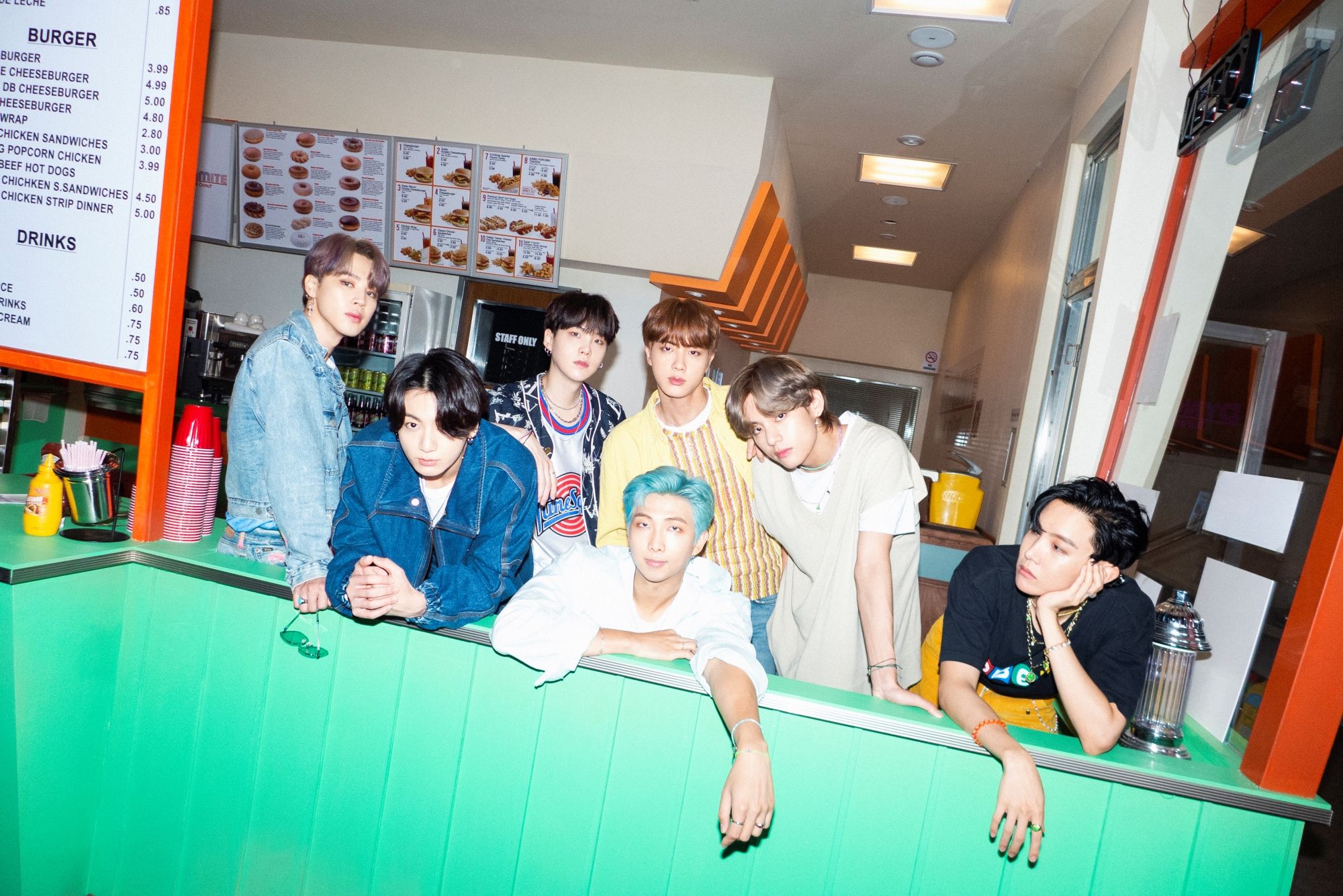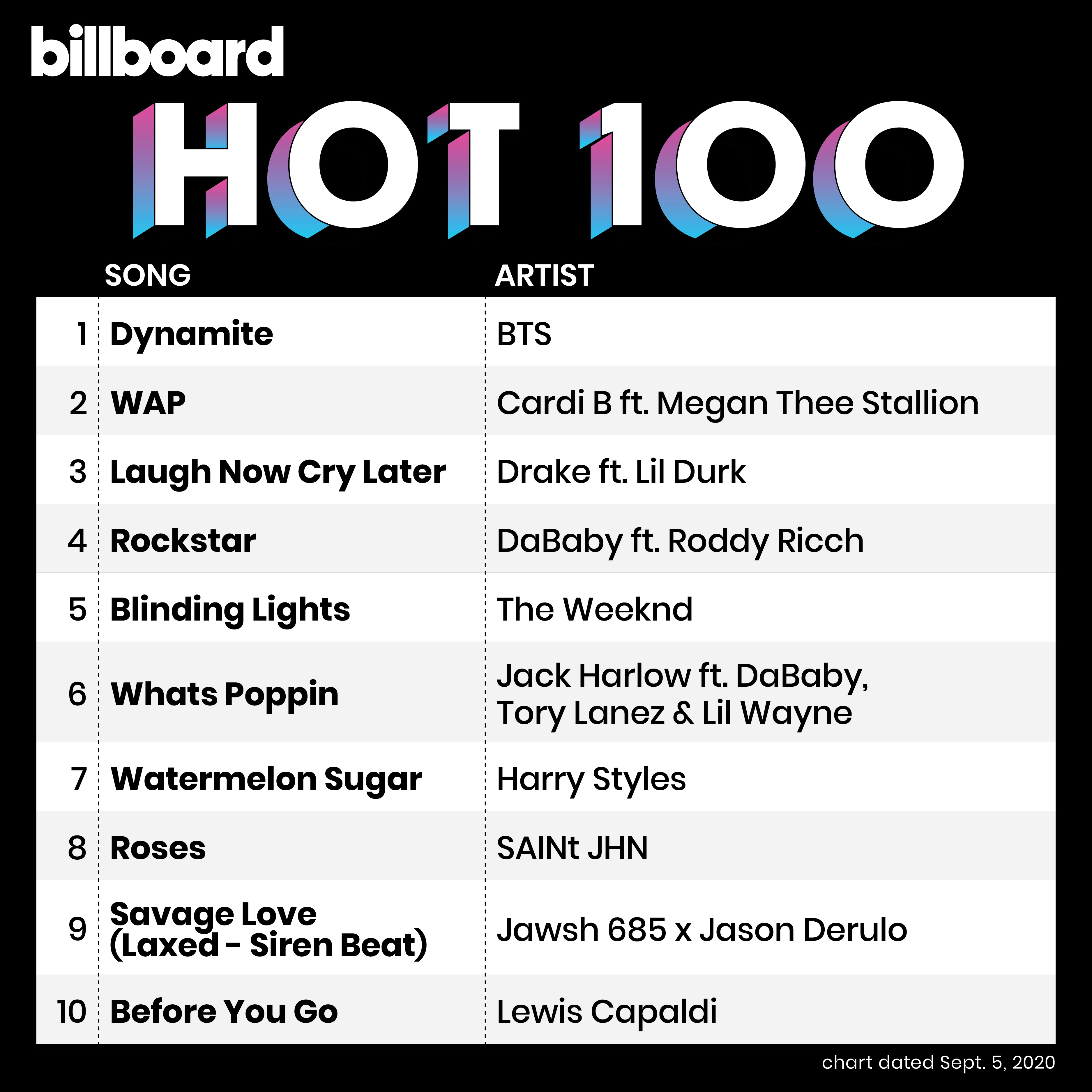
REVIEW
Why Dynamite is Phenomenal
Understanding “Dynamite” through the Billboard charts
2020.09.21
As more and more K-pop artists are entering the Billboard charts recently, it seems like it has now become the official charts for Korean fans. Here's a brief summary for those who are not familiar with the Billboard charts. People might have different opinions for the third most important chart, but the first two are always the same: the Billboard 200, that lists popular albums, and the Hot 100, that lists popular songs.
The Hot 100 publishes the most popular songs every week. It is tricky to define what song is “popular” especially today, when there are numerous channels through which people consume music. That is why Billboard added new indexes such as digital song sales and number of streams to the existing calculation system which looked at album sales and radio plays. Billboard has not yet clarified how each category is weighed, but it is known that the album/digital song sales have priority, followed by radio plays, and then streams. Although it is the least influential, online streaming is the number one mode of consumption and more detailed rules apply. Paid subscription streams are given one point per play, ad-supported free platforms are given two-thirds of a point, and programmed streams like radio services are given one-half a point per play.
The Billboard 200 lists the most popular albums each week and the rules are quite simple compared to Hot 100. 10 track sales, 1,250 streams on paid subscription services, and 3,750 streams on ad-supported services each equal to one album unit. There is no need to buy or listen to all the tracks in the album at once. There is a more complex rule for counting albums bundled with concert tickets or merchandise, but there is no need to get into that much detail.
BTS’ “Dynamite” debuted at No.1 on the Hot 100 on September 5th, 2020 and maintained its status until September 12th. It now stands at No.2 as of September 19th. Let’s rewind to when they first topped the Billboard chart. The song was streamed 33.9 million times, ranking third and holding the highest record among BTS’ songs. Digital song sales ranked No.1 with 265,000 downloads, the second biggest sales after Taylor Swift’s “Look What You Made Me Do,” recording 350,000. “Dynamite” is the 43rd song to debut at No.1 in Billboard’s history. This might seem easy since eight songs so far have debuted at No.1 in 2020 alone, but it only started in 1995 with Michael Jackson’s hit “You Are Not Alone.” BTS is the third Asian artist to rank first, followed by “Sukiyaki” in 1963 and “Like a G6” in 2010.
The Hot 100 publishes the most popular songs every week. It is tricky to define what song is “popular” especially today, when there are numerous channels through which people consume music. That is why Billboard added new indexes such as digital song sales and number of streams to the existing calculation system which looked at album sales and radio plays. Billboard has not yet clarified how each category is weighed, but it is known that the album/digital song sales have priority, followed by radio plays, and then streams. Although it is the least influential, online streaming is the number one mode of consumption and more detailed rules apply. Paid subscription streams are given one point per play, ad-supported free platforms are given two-thirds of a point, and programmed streams like radio services are given one-half a point per play.
The Billboard 200 lists the most popular albums each week and the rules are quite simple compared to Hot 100. 10 track sales, 1,250 streams on paid subscription services, and 3,750 streams on ad-supported services each equal to one album unit. There is no need to buy or listen to all the tracks in the album at once. There is a more complex rule for counting albums bundled with concert tickets or merchandise, but there is no need to get into that much detail.
BTS’ “Dynamite” debuted at No.1 on the Hot 100 on September 5th, 2020 and maintained its status until September 12th. It now stands at No.2 as of September 19th. Let’s rewind to when they first topped the Billboard chart. The song was streamed 33.9 million times, ranking third and holding the highest record among BTS’ songs. Digital song sales ranked No.1 with 265,000 downloads, the second biggest sales after Taylor Swift’s “Look What You Made Me Do,” recording 350,000. “Dynamite” is the 43rd song to debut at No.1 in Billboard’s history. This might seem easy since eight songs so far have debuted at No.1 in 2020 alone, but it only started in 1995 with Michael Jackson’s hit “You Are Not Alone.” BTS is the third Asian artist to rank first, followed by “Sukiyaki” in 1963 and “Like a G6” in 2010.
-
 ©️ Billboard
©️ Billboard
“Dynamite” remained on top for a second week with 17.5 million streams (No. 9) and 180,000 downloads (No.1). There are only 20 songs that ranked No.1 for two consecutive weeks and BTS is the first band to join the club since Aerosmith's "I Don't Want to Miss a Thing" in 1998. “Dynamite” is the first song to sell over 180,000 downloads for two weeks in a row since The Chainsmokers' "Closer.” Cardi B, who became somewhat of a benchmark for American pop culture in Korea, stands at No.2 with “WAP,” with around 60 million streams and about 20,000 downloads for the past two weeks.
On the chart dated September 19th, “Dynamite” drew 140,000 downloads (No.1), 13 million streams (No. 16), and made its debut at No.49 on Billboard’s Radio Songs chart. “WAP” took back its No.1 spot with 48 million streams (No.1), 16,000 downloads (No.2), and ranked No.27 on the radio chart. Exchanging the first and second spots with digital song sales and streams on the Hot 100 is unusual. Since the past few years, streaming has been on the rise while album/download sales glaringly declined and the influence of radio airplay, which was considered as a traditional media, in fact, increased. As you can see from the difference in downloads between “Dynamite” and “WAP,” it is rare for digital song sales to be in the 100,000s. Normally, Hip-Hop and R&B songs dominate the Hot 100 with streams while Pop and Rock songs seek their way onto the chart via radio airplay. Taylor Swift and Ariana Grande are some of the rare artists who don’t play by this rule. But now we can say that BTS found its own breakthrough by digital song sales..
This is clearly seen in BTS’ past results. On March 7th, “ON” debuted at No.4 on the Hot 100, with 86,000 downloads (No.1) and 18 million streams (No.12). On April 27th, 2019, “Boy With Luv” debuted at No.8 on the Hot 100 with 30,000 downloads and 30 million streams. Their streaming plays were stellar but not enough to hit No.1 combined with their downloads. Reaping good results with radio airplay is no easy feat either, which is dominated by Pop, Rock, or Country songs. Even if they do, it takes time for radio airplay to affect the charts. It took three weeks for “Dynamite” to make its debut at No.49 on the Billboard’s Radio Songs chart. Despite their popularity in the U.S, it’s BTS’ first time to enter the radio chart that encompasses all music genres.
On the chart dated September 19th, “Dynamite” drew 140,000 downloads (No.1), 13 million streams (No. 16), and made its debut at No.49 on Billboard’s Radio Songs chart. “WAP” took back its No.1 spot with 48 million streams (No.1), 16,000 downloads (No.2), and ranked No.27 on the radio chart. Exchanging the first and second spots with digital song sales and streams on the Hot 100 is unusual. Since the past few years, streaming has been on the rise while album/download sales glaringly declined and the influence of radio airplay, which was considered as a traditional media, in fact, increased. As you can see from the difference in downloads between “Dynamite” and “WAP,” it is rare for digital song sales to be in the 100,000s. Normally, Hip-Hop and R&B songs dominate the Hot 100 with streams while Pop and Rock songs seek their way onto the chart via radio airplay. Taylor Swift and Ariana Grande are some of the rare artists who don’t play by this rule. But now we can say that BTS found its own breakthrough by digital song sales..
This is clearly seen in BTS’ past results. On March 7th, “ON” debuted at No.4 on the Hot 100, with 86,000 downloads (No.1) and 18 million streams (No.12). On April 27th, 2019, “Boy With Luv” debuted at No.8 on the Hot 100 with 30,000 downloads and 30 million streams. Their streaming plays were stellar but not enough to hit No.1 combined with their downloads. Reaping good results with radio airplay is no easy feat either, which is dominated by Pop, Rock, or Country songs. Even if they do, it takes time for radio airplay to affect the charts. It took three weeks for “Dynamite” to make its debut at No.49 on the Billboard’s Radio Songs chart. Despite their popularity in the U.S, it’s BTS’ first time to enter the radio chart that encompasses all music genres.
-
 Dynamite MV
Dynamite MV
Then, is it important to hit No.1 with all these complicated rules? The answer could be both Yes and No. First, No: With “Boy With Luv” ranking No.8 and “Fake Love” ranking No.10, BTS is already an artist that regularly enters the Top 10. BTS is now a mainstream artist. Billboard is inherently a medium for those in the music industry and the charts are tools that summarize the market trend for the insiders. The Hot 100 does not simply line up popular songs by number of sales. Instead, it takes into consideration the various consumption channels thereby ascertaining the American taste. It’s true that “Dynamite” was better received by the American public with its all-English lyrics, but nonetheless, BTS is still an Asian boy band to the majority. Plainly put, they are a few steps behind UK’s One Direction.
But Yes: Despite all this, ranking No.1 is important. Then what is the difference between Top 10 and No.1? To BTS, holding the top spot is an outcome of transcending the complex barrier of discrimination, exclusion, and prejudice. It sends a message that is different from substantial commercial success. This is not a success story about overcoming racial discrimination and butting in headfirst onto the radio playlist. If that’s all this is, then the next move would be to check off “hitting No.1 with a Korean song!” from a list of missions. The message is the answer to the question, “What did BTS achieve in the music industry?”
Ethnicity and language getting in the way of popularity is not a uniquely American phenomenon, and one can even say it’s inevitable. Only four non-English songs hit No.1 on the Hot 100 and the last one was “La Bamba” in 1987. Even if songs that are partly English are counted like “Macarena” or “Despacito,” they amount to less than 10 songs. BTS also faces the issue of prejudice against boy bands. Stigma regarding boy bands and idol groups is deeply entrenched and is a huge flag for unfair treatment. Justin Bieber is still unable to break free from the mockery that tormented him in the past. One Direction probably never lost sleep over not hitting No.1 on the Hot 100, but it isn’t easy for Harry Styles to enter the radio chart even though he released remarkable albums. What they sang were harmless. But this harmlessness is not read as innocent, but artificial. And this later pushes them to take the risk of transforming themselves into “grown-up artists.”
However, BTS is overcoming this prejudice in their own way. Their positive vibe may seem rooted in the traditional East Asian idol group style, but BTS sets themselves apart by avoiding the trap of “unpleasant harmless.” And BTS is not alone. Several K-pop artists also managed to create their own value. However, BTS maintains a consistent attitude. Even BTS would not have expected that their brand of consistency would be persuasive, going beyond countries, ethnicities, and languages. Releasing “Dynamite” in English helped, but that was not enough to slingshot the song from Top 10 to No.1. We are witnessing a very unusual and unprecedented boy band make their way onto the stage and grow. At least to me, their nationality or language is not an issue, and I hope more people would feel the same.
But Yes: Despite all this, ranking No.1 is important. Then what is the difference between Top 10 and No.1? To BTS, holding the top spot is an outcome of transcending the complex barrier of discrimination, exclusion, and prejudice. It sends a message that is different from substantial commercial success. This is not a success story about overcoming racial discrimination and butting in headfirst onto the radio playlist. If that’s all this is, then the next move would be to check off “hitting No.1 with a Korean song!” from a list of missions. The message is the answer to the question, “What did BTS achieve in the music industry?”
Ethnicity and language getting in the way of popularity is not a uniquely American phenomenon, and one can even say it’s inevitable. Only four non-English songs hit No.1 on the Hot 100 and the last one was “La Bamba” in 1987. Even if songs that are partly English are counted like “Macarena” or “Despacito,” they amount to less than 10 songs. BTS also faces the issue of prejudice against boy bands. Stigma regarding boy bands and idol groups is deeply entrenched and is a huge flag for unfair treatment. Justin Bieber is still unable to break free from the mockery that tormented him in the past. One Direction probably never lost sleep over not hitting No.1 on the Hot 100, but it isn’t easy for Harry Styles to enter the radio chart even though he released remarkable albums. What they sang were harmless. But this harmlessness is not read as innocent, but artificial. And this later pushes them to take the risk of transforming themselves into “grown-up artists.”
However, BTS is overcoming this prejudice in their own way. Their positive vibe may seem rooted in the traditional East Asian idol group style, but BTS sets themselves apart by avoiding the trap of “unpleasant harmless.” And BTS is not alone. Several K-pop artists also managed to create their own value. However, BTS maintains a consistent attitude. Even BTS would not have expected that their brand of consistency would be persuasive, going beyond countries, ethnicities, and languages. Releasing “Dynamite” in English helped, but that was not enough to slingshot the song from Top 10 to No.1. We are witnessing a very unusual and unprecedented boy band make their way onto the stage and grow. At least to me, their nationality or language is not an issue, and I hope more people would feel the same.
Article. Seongdeok Seo(Music Critic)
Photo Credit. BIGHIT MUSIC
Copyright © Weverse Magazine. All rights reserved.
Unauthorized reproduction and distribution prohibited.
Unauthorized reproduction and distribution prohibited.
Read More